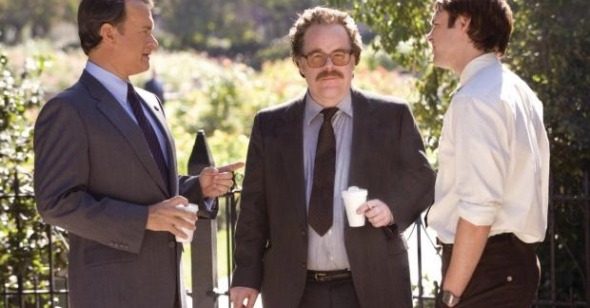Blast from the Past
By Chris Wisniewski
Charlie Wilson's War
Dir. Mike Nichols, U.S., Universal
Charlie Wilson's War announces what kind of movie it is from the opening shot, when an animated mujahideen turns to the camera and launches a missile right at the audience, and—bombs away!—the title is revealed in an explosion of red, white, and blue. From there, it's on to the first half of a clumsily conceived book-end, with Tom Hanks's eponymous Texas Congressman receiving a special civilian award from the CIA for his hand in turning the tide of the Cold War against the Soviets, in front of an audience that includes an unfortunately blond Julia Roberts and an unfortunately mustachioed Philip Seymour Hoffman. These are the central players in the drama proper, an aggressively frothy tale of political intrigue set in the good old days when Red states were in Eastern Europe, not the American Midwest; coke was in (before it was out and then back in again); Dan Rather was on 60 Minutes wearing a turban; and the United States was engaged in an epochal struggle of Good versus Evil, played out in the distant lands of the Middle East. Good times.
Aesthetically uninteresting and ideologically dubious, Charlie Wilson's War repackages a critical turning point in world history—the covert American intervention on behalf of the mujahideen in the Soviet-Afghanistan war—as a delightful romp through the offices of Congress, the bedroom of the wealthy, conservative Texas socialite Joanne Herring (Roberts, with a vaguely embarrassing Southern drawl), and the presidential palace of Pakistan. Screenwriter Aaron Sorkin has adapted the script from George Crile's book, fashioning this true-life story into something resembling a sub-par West Wing episode, ingratiating, too clever by half, and not nearly as intellectually spry or engrossing as one might expect, given its pedigree. Sorkin can be an adept dramatist (see West Wing’s first two seasons), but this film suffers from a total absence of dramatic conflict: Everyone onscreen, from Hanks's Wilson and Hoffman's CIA agent Gust Avrakotos all the way down to the Pakistanis and the Israelis, is fighting for the same cause, just with varying degrees of effort and conviction (in fact, Wilson's success is less a hard-won victory than a happy side effect of his colleagues’ ambivalence), and we already know how this story ends before it starts (even without the bookends, thanks).
Charlie plays as an ostensible character study of Hanks's boozy, sexist Wilson, a jaded, crass politician who has a moral reawakening upon learning about the plight of the Afghan refugees. But aside from a few unconvincing shots of Hanks crying alone in his room, no effort is made to give Wilson any real interiority. Charlie's a real man's man—a scotch-drinking, socialite-fucking Cold Warrior who refers to his uniformly young, uniformly beautiful, uniformly female staff as “jail bait,” and director Mike Nichols totally loves it—how else to explain the playfulness with which Nichols depicts Charlie sneaking a morning drink before meeting with a wealthy constituent or the dissolve, late in the film, from a shot of some mujahideen fumbling with their new weapons to a close-up of the shapely ass of Wilson's administrative aide (Amy Adams)? The film’s a veritable nostalgic celebration of the Cold War mentality Wilson embodies, with its large guns, tall drinks, and big tits. Forget Hanks's tacked-on crocodile tears (if this film were from the Code Era, I would have taken these awkward, completely unmotivated scenes as last-minute additions meant to fulfill the requirement for "compensating moral values")—Nichols reifies rather than deconstructs Wilson's crusty masculinity.
Charlie Wilson's War works overtime in its brisk 97 minutes to entertain and edify in equal parts, but Nichols never manages to find a balanced tone, particularly in his depiction of the war. Though he occasionally makes heavy-handed use of archival footage and pulls heavy on the heartstrings with some wounded and maimed Afghani children, he often directs the mujahideen like he’s staging a scene from a lost Hot Shots sequel. The film has been marketed as some sort of comedy (though it's not very funny), but Nichols's glib treatment of the conflict betrays the compelling moral question his movie tries unsuccessfully to raise in its abrupt coda: Did the human cause of the refugees justify covert intervention in the war, an action predicated on the disastrous assumption that the enemy of our enemy was indeed our friend?
Sorkin and Nichols try to make a historical and political comment in the film’s final act, as Gust imparts a parable about a boy, a Zen master, and a horse, mostly to imply that the long-term consequences of an action are difficult to gauge in the short-term. For a film that takes only a passing interest in Afghanistan and offers no insight into who the mujahideen were (and still less into who they became), this amounts to little more than shoulder-shrugging. The film finally follows Wilson's lead in asserting that the crucial mistake was a lapsed commitment to the Afghani reconstruction and not, say, arming and training the mujahideen in the first place. But if you honestly believe that everything would have turned out okay if we had just allocated an extra $1 million to build a school, then I've got a bridge to sell you. It's the most egregious failing of this toneless, flat, and superficial film: Nichols and Sorkin are more interested in turning this story into a metaphor for our contemporary situation, rather than a prelude to it.
